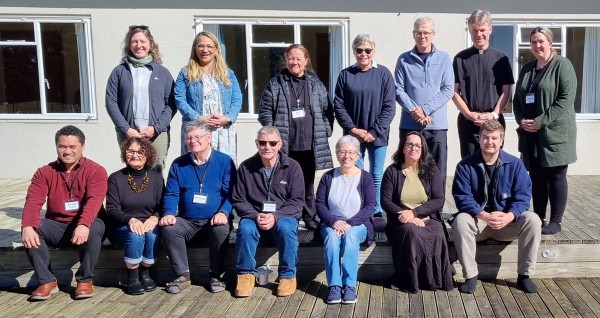Formation programme encourages communal discernment

by Amy Armstrong
What happens when Church leaders pause, pray and truly listen – not only to Atua, God, but also to te tangata, one another, and the whenua upon which we stand? Something new begins to take root: a way of being Church that is Spirit-led, inclusive and alive with hope.
This year, the New Zealand Catholic Bishops Conference launched the Communal Apostolic Discernment Facilitators pilot programme to help leaders grow in the practice of discernment in common – the heart of what Pope Francis calls a “synodal Church”. Rather than making decisions in isolation, participants learned to journey together, listening deeply and allowing the Spirit to guide the whole community.
At its heart, the programme nurtures a culture of listening and shared leadership. It is designed for clergy and lay leaders who are prayerful, open to growth and eager to discover new ways of fostering God’s presence in their communities. Along the way, participants discovered that discernment is more than a skill; it is a way of life that can transform parishes, schools and ministries into vibrant places of connection and mission, rooted in the Gospel and attentive to the voices of all.
The facilitators brought rich experience and gentle wisdom. Fr Michael Smith SJ drew on Ignatian spirituality, pastoral counselling and positive psychology. Lucienne Hensel, pastoral ministry advisor in the Wellington Archdiocese, has guided Synod conversations across the country. Together, they led participants from five dioceses through a blend of input, sacred readings, contemplative exercises and group sharing, supported by online sessions that balanced teaching with hands-on practice in local ministry settings.
The journey began in April with a five-day intensive at the Magnificat Community in Featherston, where prayer, silence and reflection created a strong foundation of trust. Monthly online gatherings followed, giving participants space to share their discernment projects in their own communities while receiving encouragement, feedback and support.
The course concluded with a second five-day intensive at St Francis Retreat Centre in Auckland in September, centred on the Final Document from the Synod on Synodality: For a Synodal Church: Communion, Participation, Mission. Guest speakers Rocio Figueroa, Manuel Beazley and Bishop Steve Lowe offered fresh perspectives, reminding participants that synodality is always enriched by many voices. By the end of the course, discernment leaders had begun to emerge, encouraging and guiding one another as peers.
Why is this pilot course important? Because synodality is not a passing phase; it is the future of the Church. At the same time, it is not new. From the earliest days, as recorded in the Acts of the Apostles, the Church discerned in common. The first disciples gathered to pray, listen and decide together under the guidance of the Holy Spirit. Vatican II renewed this vision for our time, and each Pope since has fostered it in different ways. Pope Francis brought synodality to the forefront through the Synod on Synodality, inviting the whole Church to walk this path together once again.
Here in Aotearoa, synodality calls us to trust that the Spirit speaks through the land and through every voice that treads upon it. Sometimes this confirms what we already know; at other times, it stretches us to broaden the tent. The more we practise listening together – to God, to one another and to the land – the more deeply this way of being Church will take root as a living, Spirit-filled journey.
Amy Armstrong from the Dunedin Diocese was one of the participants in the Communal Apostolic Discernment Facilitators programme.